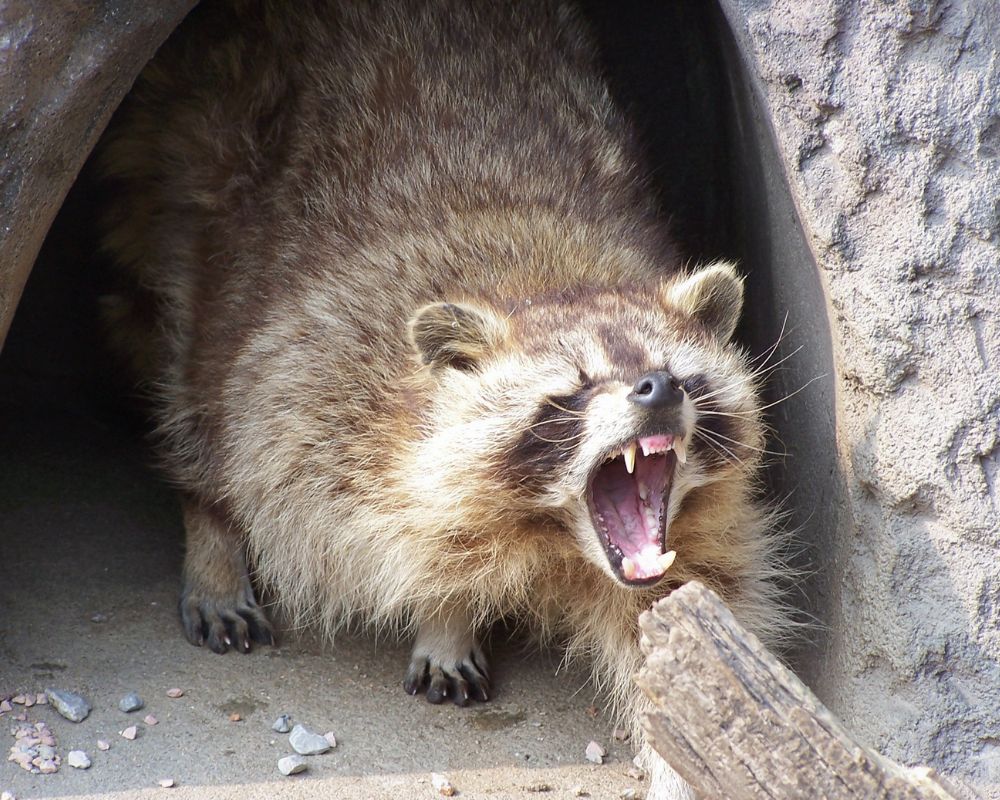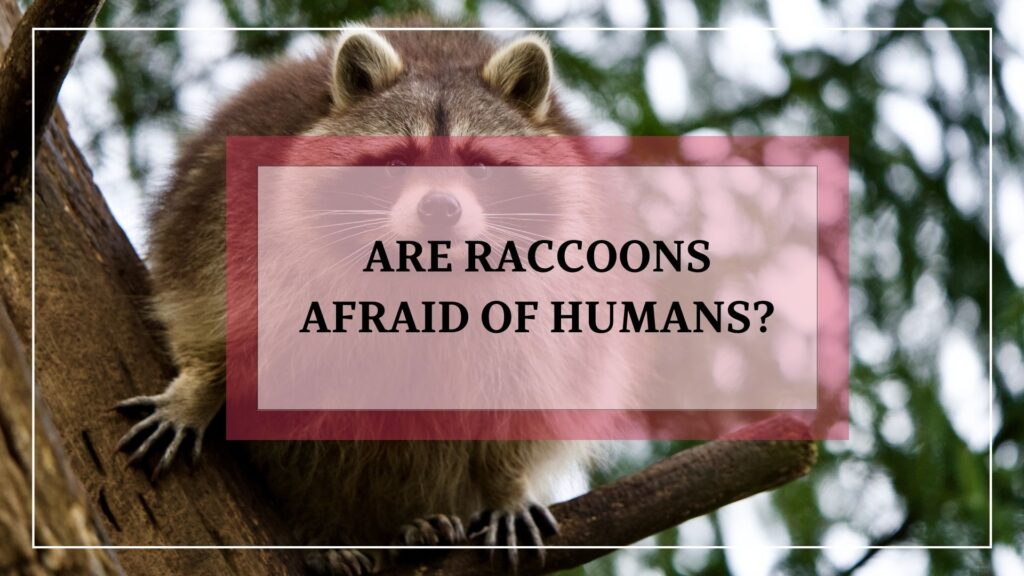Raccoons are a common sight in urban and suburban areas, known for their intelligence and adaptability. They are nocturnal animals and are primarily active at night, foraging for food and exploring their environment.
Despite their proximity to human populations, there is a common perception that these animals are afraid of people. However, the reality is more complex than this simple stereotype.
In this article, we will explore the various factors that influence raccoons’ behavior around humans, as well as strategies for coexisting with these intelligent and adaptable animals.
From their natural fear response to their ability to adapt to human environments, this article will provide a deeper understanding of raccoons and their relationship with humans.
Are Raccoons Afraid Of Humans?
Raccoons are typically not afraid of humans, but they may be cautious around them. Raccoons are known to be quite adaptable and can live close to humans in urban and suburban areas.
However, if a raccoon feels threatened or cornered, it may defend itself by biting or scratching. It’s always best to avoid contact with wild animals, including raccoons, to prevent the spread of disease and to keep both humans and animals safe.
Why may raccoons not be afraid of humans?
There are different reasons including:
1. Raccoons’ Adaptability And Intelligence
Raccoons are highly adaptable and intelligent animals, which contributes to their ability to coexist with humans in urban and suburban environments.
They can quickly learn and adapt to new situations, such as finding food sources in human-populated areas. Additionally, raccoons have a natural curiosity and tendency to explore, which allows them to become accustomed to the presence of humans and not fear them.
This adaptability and intelligence also allow raccoons to overcome man-made obstacles, such as traps and barriers, which can make them difficult to control in areas where they are considered a nuisance.
2. Habituation To Human Presence
Habituation refers to the process by which an animal becomes accustomed to the presence of humans and loses its natural fear or wariness of them.
This can occur when raccoons are frequently fed by people, or when they live close to human settlements. Over time, they may come to associate humans with food and no longer perceive them as a threat.
As a result, they may not display fear or avoidance behaviors when they encounter humans. Habituation can also increase the likelihood of raccoons becoming a nuisance or causing property damage.
3. Lack Of Natural Predators In Urban Areas
In urban areas, raccoons typically do not have natural predators, such as coyotes or wolves, that would normally keep their population in check.
Without these predators, raccoons can thrive in urban environments and come into close contact with humans. As a result, they may not be as afraid of humans as raccoons in more natural settings would be, as they have not had to develop a fear of humans to survive.
Additionally, raccoons in urban areas may also become accustomed to human presence and food sources, further reducing their fear of people.
How raccoons may become aggressive towards humans?
Yes! Raccoons can become aggressive towards humans in certain circumstances like the following ones:
1. Protection Of Young Or Territory

Raccoons are typically not aggressive towards humans, but they may become so if they feel threatened or if their young or territory are being threatened. Raccoons are territorial animals and will defend their home and family against perceived threats.
2. Rabies Or Other Illnesses
Rabies is a viral disease that affects the nervous system of mammals, including raccoons. It is transmitted through the saliva of infected animals, typically through a bite or scratch. If a raccoon is infected with rabies, it may exhibit aggressive behavior toward humans. This is because the virus causes changes in the brain that can lead to aggression, confusion, and other abnormal behavior.
Raccoons with rabies may also appear disoriented or paralyzed, have difficulty swallowing, and may foam at the mouth. If a raccoon displays these symptoms, it should be considered dangerous and avoided.
Other illnesses that can cause raccoons to be aggressive towards humans include distemper, a viral disease that affects the respiratory, gastrointestinal, and nervous systems, and mange, a skin condition caused by mites. These illnesses can also lead to abnormal behavior in raccoons and make them more likely to attack humans.
It is important to note that raccoons are wild animals and should not be approached or handled. If you suspect a raccoon may be sick, it’s best to contact your local wildlife agency for assistance.
3. Feeling Threatened Or Cornered
They may also become aggressive if they are cornered or trapped, as they will feel the need to protect themselves.
Additionally, if a raccoon has become accustomed to being fed by humans, it may become aggressive if it feels that its food source is being threatened. In these situations, it is important to give raccoons space and not approach them or their young, as this may provoke an aggressive response.
How to safely interact with raccoons?
It is generally not recommended to interact with raccoons for the reasons of their aggressiveness mentioned above. However, If you encounter a raccoon, here are a few techniques to use :
1. Avoiding Confrontation And Giving Them Space
Avoiding confrontation and giving raccoons space is the best way to interact with them. Raccoons can carry diseases such as rabies and should not be approached or touched. If you see a raccoon in your yard, try to scare it away by making loud noises or spraying it with a hose. [1]
2. Not Feeding Or Encouraging Dependence On Humans
Do not leave food out for raccoons, as it can attract them to your property and lead to increased interactions. Keep trash cans securely sealed, and if necessary, install barriers such as fencing to keep raccoons away from your home.
It’s also important to keep pet food and water bowls inside to avoid attracting raccoons.
If you have a raccoon problem on your property, it is best to contact a professional wildlife control expert for assistance.
FAQs
Can Raccoons Sense Fear?
Raccoons cannot sense fear in humans or other animals. They can detect danger or a potential threat through their sense of sight, smell, and hearing, but they do not have a specialized ability to sense fear.
Do Raccoons Attack Humans At Night?
Raccoons are generally not considered to be aggressive animals and will typically avoid contact with humans. However, if a raccoon feels threatened or cornered, it may defend itself by biting or scratching.
Raccoons are also known to carry diseases such as rabies, so it’s important to avoid contact with them. It is also important to note that raccoons are nocturnal animals, they are active mostly at night and they tend to be more active during the spring and summer months when they are feeding and raising their young.
The Bottom Line
In summary, raccoons are not naturally afraid of humans but may be cautious around them. They are highly adaptable and intelligent animals that can live close to humans in urban and suburban areas.
However, if a raccoon feels threatened or cornered, it may defend itself by biting or scratching. Habituation, lack of natural predators, and being fed by humans can make raccoons less afraid of people.
Raccoons can become aggressive towards humans in certain circumstances such as protecting their young or territory, or if they are infected with rabies or other illnesses. It’s always best to avoid contact with wild animals, including raccoons, to prevent the spread of disease and to keep both humans and animals safe.

